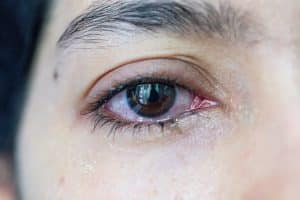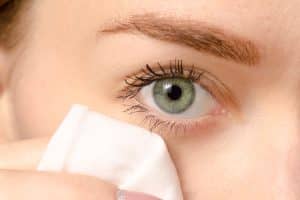Discomfort or irritation in your eyes can be very distracting, particularly if it affects your ability to see properly. While you might be tempted to just put up with it, sometimes that just isn’t viable – problems with your vision can have a huge impact on your day-to-day activities for work, travel, school and your home life. Treating these problems can ease the irritation, but it’s important to be able to identify what the problem is in order to choose the right treatment.
What are the symptoms of dry eye?
As it’s a condition with a self-explanatory name, most people are aware that one of the main signs of dry eye is that your eyes feel insufficiently lubricated. This can make them feel itchy or sore, and you might notice yourself feeling the need to blink more often than usual. You might even get the sensation that there’s something in your eye, such as sand, grit or an eyelash.
Although your eyes may feel dry, you might also find that you’re producing more tears than usual in order to counteract the dryness. This can make your eyes feel watery. Watery eyes may be visible when you see your reflection, and you may notice the whites of your eyes appear to be a pale red colour as well. Alternatively, the capillaries in your eyes may be more pronounced than normal, making your eye appear bloodshot.
On top of this, dry eye syndrome may cause your eyes to be more sensitive to light. For instance, looking at a bright ceiling light may make you recoil, squint, blink more often and your eyes might water more. But this doesn’t just apply to lightbulbs – your sensitivity to other light sources can also increase, including windows, computer or phone screens and fire. You might even notice an increased sensitivity to pale or white objects in indirect light, as these tend to be brighter than darker surfaces.[1]
Can dry eyes cause blurry vision?
It’s also very normal for dry eyes to cause blurred vision. In part, this is down to the extra lubrication caused by watery eyes – people often find that tears obstruct their vision and make it harder to correctly identify fine details such as letters or numbers. You may find your vision becomes less blurry when you blink to clear your eyes and dispel tears. Treating dry eyes should get rid of blurred vision, but if you continue to have blurred vision after treatment, you should consult your optometrist about other potential causes.[1]
Can dry eyes cause headaches?
There is some evidence to suggest that there may be a link between dry eyes and headaches, but it’s not clear whether one causes the other, vice versa, or whether there’s just a correlation between them. This is partly because both conditions can be caused by similar things. For instance, a headache may be caused by dehydration, and dehydration may reduce your ability to make tears, resulting in dry eyes.[1]
How long does dry eye last?
Dry eye syndrome is one of those afflictions which may last only for a short period of time, but can sometimes also last for much longer. Generally, the duration of the condition will depend on what’s causing it.
For example, dry eyes from too much time spent staring at a screen will usually ease after you start spending less time in front of your laptop, tablet or TV. If you don’t make the change, however, the irritation may last longer. Dry eyes caused by a windy day often go away once you’ve been out of the wind for a little while. On the other hand, chronic dry eyes may be caused by problems with your tear ducts.[1]
Dry eye treatments such as TheraTears® Dry or Tired Eye Drops are formulated with hyaluronic acid which acts to lubricate and rejuvenate your eyes and reduce the irritation of dry eyes, allowing you to get on with your day-to-day activities. However, if your eyes continue to feel dry for a week or more, it’s best to speak to your eye doctor. They will be able to assess your condition in detail, help you to identify what’s causing your dry eyes and recommend a treatment.
Resources:







